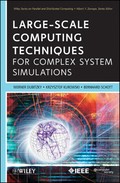Large-Scale Computing Techniques for Complex System Simulations
Wiley Series on Parallel and Distributed Computing (Series Nr. 1)

1. Edition December 2011
220 Pages, Hardcover
Wiley & Sons Ltd
Short Description
This edited text presents an overview of contemporary large-scale computing technologies in the context of complex system simulation applications. It bridges the gap between computer tech & complex systems modeling and simulation, featuring cutting-edge research taken from the QosCosGrid (Quasi-opportunistic supercomputing for complex systems in Grid environments) research and development project. The book simultaneously serves as a design blueprint, user guide, research agenda, and communications platform for researchers, technology and application developers, and scientists, as well as students and teachers looking to understand the limitations and future directions of large-scale computing technologies.
Complex systems modeling and simulation approaches are being adopted in a growing number of sectors, including finance, economics, biology, astronomy, and many more. Technologies ranging from distributed computing to specialized hardware are explored and developed to address the computational requirements arising in complex systems simulations.
The aim of this book is to present a representative overview of contemporary large-scale computing technologies in the context of complex systems simulations applications. The intention is to identify new research directions in this field and to provide a communications platform facilitating an exchange of concepts, ideas and needs between the scientists and technologist and complex system modelers. On the application side, the book focuses on modeling and simulation of natural and man-made complex systems. On the computing technology side, emphasis is placed on the distributed computing approaches, but supercomputing and other novel technologies are also considered.
Preface xv
Contributors xix
1. State-of-the-Art Technologies for Large-Scale Computing 1
Florian Feldhaus, Stefan Freitag, and Chaker El Amrani
1.1 Introduction 1
1.2 Grid Computing 2
1.3 Virtualization 6
1.4 Cloud Computing 8
1.5 Grid and Cloud: Two Complementary Technologies 12
1.6 Modeling and Simulation of Grid and Cloud Computing 13
1.7 Summary and Outlook 15
References 16
2. The e-Infrastructure Ecosystems: Providing Local Support to Global Science 19
Erwin Laure and Åke Edlund
2.1 The Worldwide e-Infrastructure Landscape 19
2.2 BalticGrid: A Regional e-Infrastructure, Leveraging on the Global "Mothership" EGEE 21
2.3 The EGEE Infrastructure 25
2.4 Industry and e-Infrastructures: The Baltic Example 29
2.5 The Future of European e-Infrastructures: The European Grid Initiative (EGI) and the Partnership for Advanced Computing in Europe (PRACE) Infrastructures 31
2.6 Summary 33
Acknowledgments 34
References 34
3. Accelerated Many-Core GPU Computing for Physics and Astrophysics on Three Continents 35
Rainer Spurzem, Peter Berczik, Ingo Berentzen, Wei Ge, Xiaowei Wang, Hsi-Yu Schive, Keigo Nitadori, Tsuyoshi Hamada, and José Fiestas
3.1 Introduction 36
3.2 Astrophysical Application for Star Clusters and Galactic Nuclei 38
3.3 Hardware 40
3.4 Software 41
3.5 Results of Benchmarks 42
3.6 Adaptive Mesh Refinement Hydrosimulations 49
3.7 Physical Multiscale Discrete Simulation at IPE 49
3.8 Discussion and Conclusions 53
Acknowledgments 54
References 54
4. An Overview of the SimWorld Agent-Based Grid Experimentation Systems 59
Matthew Scheutz and Jack J. Harris
4.1 Introduction 59
4.2 System Architecture 62
4.3 System Implementation 67
4.4 A SWAGES Case Study 71
4.5 Discussion 74
4.6 Conclusions 78
References 78
5. Repast HPC: A Platform for Large-Scale Agent-Based Modeling 81
Nicholson Collier and Michael North
5.1 Introduction 81
5.2 Agent Simulation 82
5.3 Motivation and Related Work 82
5.4 From Repast S to Repast HPC 90
5.5 Parallelism 92
5.6 Implementation 94
5.7 Example Application: Rumor Spreading 101
5.8 Summary and Future Work 107
References 107
6. Building and Running Collaborative Distributed Multiscale Applications 111
Katarzyna Rycerz and Marian Bubak
6.1 Introduction 111
6.2 Requirements of Multiscale Simulations 112
6.3 Available Technologies 116
6.4 An Environment Supporting the HLA Component Model 119
6.5 Case Study with the MUSE Application 124
6.6 Summary and Future Work 127
Acknowledgments 128
References 129
7. Large-Scale Data-Intensive Computing 131
Mark Parsons
7.1 Digital Data: Challenge and Opportunity 131
7.2 Data-Intensive Computers 132
7.3 Advanced Software Tools and Techniques 134
7.4 Conclusion 139
Acknowledgments 139
References 139
8. A Topolpgy-Aware Evolutionary Algorithm for Reverse-Engineering Gene Regulatory Networks 141
Martin Swain, Camille Coti, Johannes Mandel, and Werner Dubitzky
8.1 Introduction 141
8.2 Methodology 143
8.3 Results and Discussion 155
8.4 Conclusions 160
Acknowledgments 161
References 161
9. QosCosGrid e-Science Infrastructure for Large-Scale Complex System Simulations 163
Krzysztof Kurowski, Bartosz Bosak, Piotr Grabowski, Mariusz Mamonski, Tomasz Piontek, George Kampis, László Gulyás, Camille Coti, Thomas Herault, and Franck Cappello
9.1 Introduction 163
9.2 Distributed and Parallel Simulations 165
9.3 Programming and Execution Environments 168
9.4 QCG Middleware 174
9.5 Additional QCG Tools 179
9.6 QosCosGrid Science Gateways 180
9.7 Discussion and Related Work 182
References 184
Glossary 187
Index 195
Krzysztof Kurowski, PhD, leads the Applications Department at Poznan Supercomputing and Networking Center in Poland. His research is focused on the modeling of advanced applications, scheduling, and resource management in networked environments.
Bernhard Schott, Dipl. Phys., is the EU-Research Program Manager for Platform Computing GmbH.


